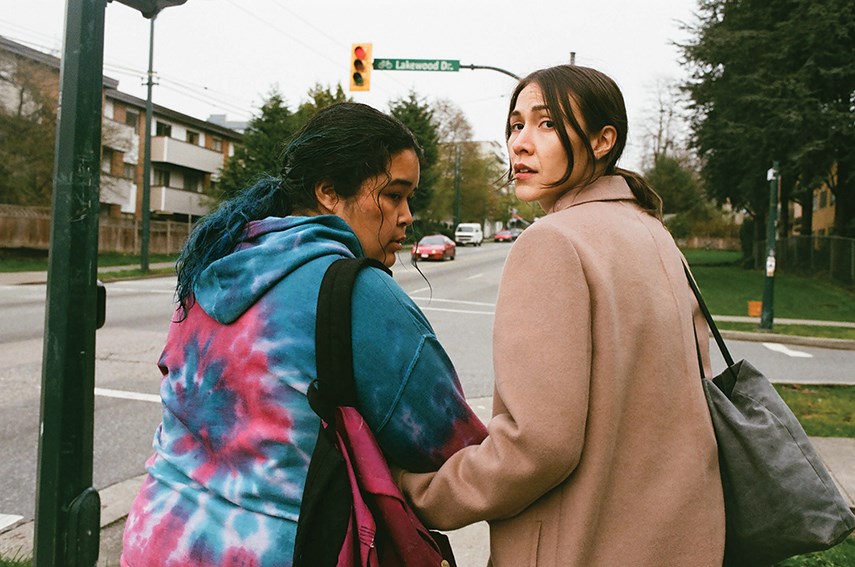The Body Remembers When The World Broke Open. Co-directed by Elle-Maija Tailfeathers and Kathleen Hepburn. Starring Elle-Maija Tailfeathers and Violet Nelson. Rating: 8 (out of 10). On-screen at .
There’s a deceptive simplicity to The Body Remembers When The World Broke Open, which takes place over the space of less than a day and features the conversation between two women almost exclusively.
The two women don’t notice each other at first: they ride the same bus, where one gets off at the doctor’s office and one heads home, where violence awaits. When we next see them, Rosie (Violet Nelson) is bruised and barefoot on the rainy sidewalk, her boyfriend swearing at her from the other side of the busy street. Aila (Elle-Maija Tailfeathers) stops to offer help, and then takes Rosie home out of harm’s way
So begins an uneasy acquaintance. Yes, both are Indigenous women, but from different experiences and at different places economically, sociologically, and reproductively. Rosie is very pregnant; Aila is 31 and just got fitted for an IUD: she casually mentions that her boyfriend wants kids, but she’s not sure. Over a cup of tea, Aila quietly nudges Rosie in the direction of a women’s shelter.
Co-directors Kathleen Hepburn and Tailfeathers, who also wrote the script, put forth an honest query about privilege here. Aila is half Blackfoot and half Sami (from Norway and Sweden), which Rosie quickly calls her out on: “everybody’s native these days, hey?” Despite the appearances of her airy, orderly flat, Aila clearly has issues of her own and is an anxious mess. Who is she to say what type of help Rosie needs?
Filmmakers go to great lengths to level the playing field between the two women, and stress their similarities in addition to what makes them unique. They both like Joni Mitchell (“Little Green” elicits a tender reaction from Rosie). They are both victims of prejudice and classism, as seen by the doctor’s casual racism during Aila’s visit. And they undress, as we all do, in the same way: Aila undresses nervously and resignedly at the doctor’s office; Rosie gets out of her wet clothing and puts on a borrowed T-shirt and sweatpants in exactly the same fashion. Entitled or not, we’re all the same when stripped bare.
Both women have suffered trauma and abuse only hinted at. Less subtle storytelling would involve long and tearful soliloquies, or flashbacks in order to manipulate the viewer. There is mutual suffering underlying this journey to mutual understanding, and no guarantees that we’ll get there.
We don’t need these women’s histories to be moved by their predicaments: the viewer becomes an active observer and invested participant thanks to Norm Li’s inquisitive, handheld camerawork and the story’s almost real-time events. Sometimes the camera follows Rose, sometimes Aila; we’re the third wheel on this outing, sitting in the cab with these women, drinking tea during their awkward conversation. It lends the film urgency and intimacy in equal measure. (And Vancouverites, take note: this is unabashedly a Â鶹´«Ă˝Ół»film, from the street addresses and relentless rain right down to the now-iconic “East Van” graffiti on one of the buildings.)
The Body Remembers is an insightful film that quietly challenges our own prejudices and reminds us that it’s a long way down from that moral high ground. So just listen and learn from the honest dialogue between two women who are looking for their safe and secure place in the world.
Ěý


